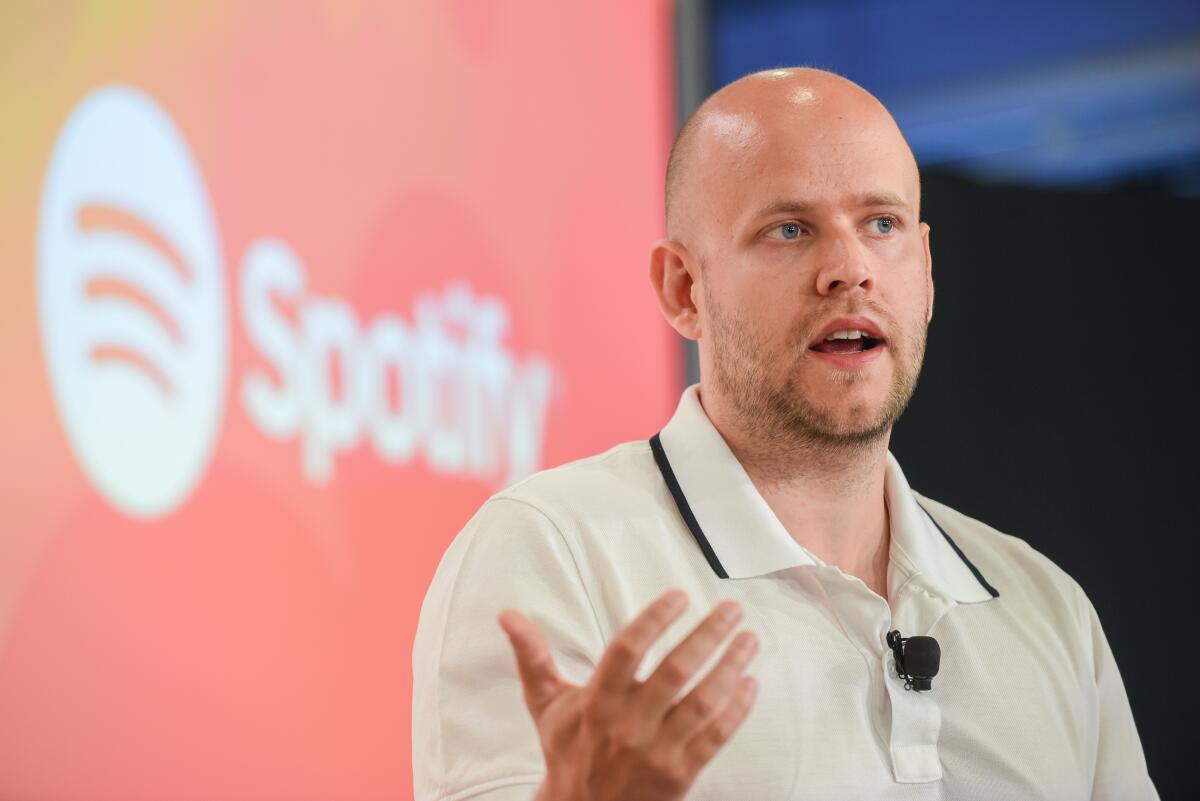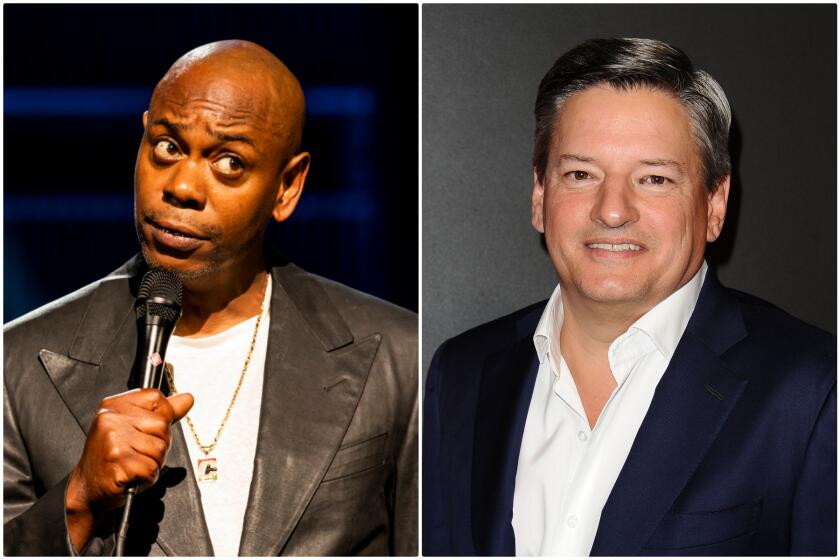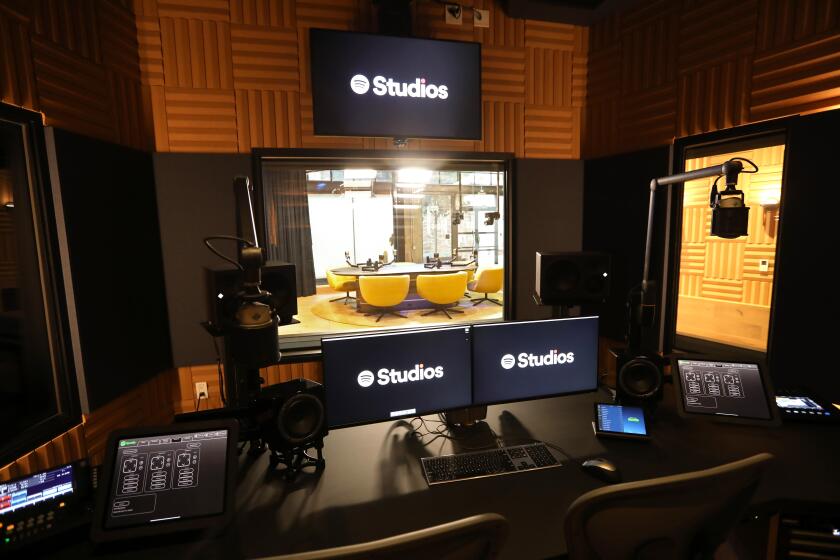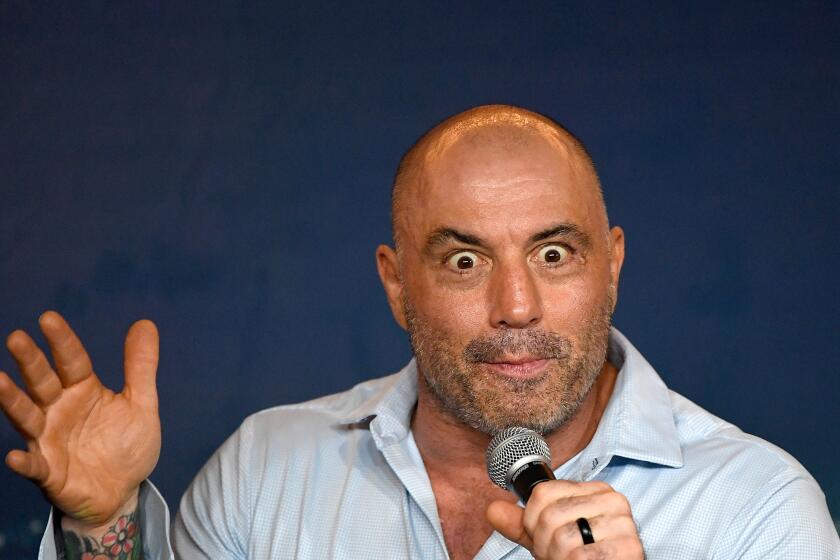Column: Spotify knows Joe Rogan’s podcast is hurtful, but gosh, there’s money to be made

- Share via
Spotify just announced its newest podcast, “Sorry, Not Sorry,” in which billionaire CEOs discuss the most effective ways to seem to apologize for profiting from content that is offensive in historically oppressive ways without actually doing anything about it.
Kicking things off is Spotify’s own Daniel Ek in conversation with Netflix’s Ted Sarandos.
OK, there is no such podcast. Yet. But it certainly looks as though they’ve been comparing notes. Ek used the weekend to take a page out of Sarandos’ playbook by sending his employees a memo designed, one assumes, to keep his employees from taking the recent Joe-Rogan-on-Spotify controversy to a Dave-Chappelle-on-Netflix level.
Last year, Chappelle’s newest comedy show for Netflix revolved, in large part, around the comedian’s anger at being “canceled” (because nothing says canceled like a Netflix special) for making transphobic jokes by — wait for it — making more transphobic jokes. Many members of Netflix staffwere so outraged they staged a walkout, and just last week the streamer’s editorial and publishing manager in film, who is trans, resigned.
Rogan, a comedian, actor and former “Fear Factor” host, has become a popular podcast provocateur known for his irreverent takes and wild assortment of guests, freely (some would say irresponsibly) discussing politics, culture and in some cases conspiracy theories. Not surprisingly, Rogan has been a vocal pandemic skeptic, using his platform to spread damaging misinformation about the COVID-19 vaccine, including his belief that healthy young people do not need to get vaccinated. When he contracted COVID last fall, he told listeners, he tried everything to fight it, including the unhelpful and potentially harmful ivermectin.
The past few months have the feel of a predictable script. After Spotify acquired “The Joe Rogan Experience” for a reported $100 million in May 2020, people inside and outside the company protested. After his Dec. 20 interview with vaccine skeptic Robert Malone, a group of scientists sent a letter of protest; not much later, Neil Young and Joni Mitchell yanked their music from the platform.
Instead of using ‘creative freedom’ to justify Chappelle’s special, Netflix should just say what it means: Inclusion is great but money is better.
Despite Ek’s efforts to explain that Spotify is not in any way responsible for the content from which it makes its money, #CancelSpotify persisted, forcing the company to — finally — publish internal guidelines for removing or flagging COVID-19 misinformation. Rogan, for his part, issued a half-baked apology, promising to do better while making it clear that any criticism of him puts “free speech” at stake.
Then musician India Arie, who is Black, posted a video montage of Rogan saying the N-word more than 20 times. And once again, we were treated to a white man apologizing for using the N-word while claiming he did not mean it in a racist way; he thought it was entertainment.
Rogan again apologized, and removed 70 episodes of “The Joe Rogan Experience” from Spotify.
And finally, the inevitable capper: The spectacle of yet another CEO apologizing for content he admits he knew was hurtful to many while explaining that there was no way in hell he would stop promoting the show that created it because it makes so much damn money.
Well, Ek didn’t come right out and say that, unfortunately. Instead Ek, like Sarandos, acknowledged the pain while acting as if he had absolutely nothing to do with it.
“There are no words I can say to adequately convey how deeply sorry I am for the way The Joe Rogan Experience controversy continues to impact each of you,” Ek wrote in a memo obtained by the Los Angeles Times. “Not only are some of Joe Rogan’s comments incredibly hurtful — I want to make clear that they do not represent the values of this company.”
But, Ek continued, he doesn’t believe “that silencing Joe is the answer.”
Why are many Americans committed to preserving words and images associated with forces bent on preventing fellow citizens from living freely and equally?
To be clear, “The Joe Rogan Experience” was a wildly successful podcast with millions of listeners long before it became Spotify’s top podcast. Should the platform decide to dump Rogan, he would in no way be “silenced”; if history is any indication, his followers would increase. They just wouldn’t be paying money to Spotify.
So what Ek should have said was: “To give up raking in profits from Joe is not the answer.”
Instead, he followed Sarandos down the familiar gaslit path by attempting to equate Spotify’s profit-driven commitment to Rogan with Rogan’s First Amendment rights, which have never been in danger.
The hijacking of the 1st Amendment for fun and profit is something we’ve seen a lot of lately; in many quarters, criticism and calls for accountability are immediately answered with complaints about cancel culture and censorship when no one is in the least danger of being canceled or censored. It is the classic “I’m not a bully, you’re a bully for telling me I’m a bully” defense of bullies everywhere.
Joe Rogan is, among many other things, living, breathing proof that Americans are indeed allowed to say whatever they think, feel and believe without fear of censure. He is a professional provocateur, airing the kind of guests and conversations that would never make it past the ethics/news guidelines of many mainstream media platforms. It is beyond disingenuous for Ek to say Spotify’s No. 1 podcast is not emblematic of Spotify’s brand. You can’t eat your cake and pretend you find it offensive too.
Ek made it very clear that Spotify’s relationship with Rogan was part of the company’s stated goal of becoming an audio platform for more than 50 million creators and 1 billion users. To accomplish this, i.e., to make Spotify a wildly successful and even more profitable company, Ek wrote, “these kinds of disputes will be inevitable” but “worth the effort.”
Spotify wants to take over the streaming world. Joe Rogan is just a means to that end.
In other words, the pain caused by Rogan, whether by anti-vaccine lies or racist pejoratives, is just the price people must pay for Spotify to continue to make money for Ek and his shareholders.
In many ways, Ek was more honest than Sarandos — who, in answering to the Chappelle protests, cis-mansplained popular comedy as being subjective: One person’s pain was another’s belly laugh, and the popularity of Chappelle’s specials proved their cultural worth. But both men are equally misrepresenting an even more important point. As noted by my colleagues Wendy Lee and Matt Pearce, they are attempting to become media moguls without accepting the kind of responsibility “media” once entailed. Ek insists he is not in any way “publishing” Rogan, merely platforming him. And paying him, and marketing him, and making him a linchpin in Spotify’s growth.
The deletion of those podcasts with the N-word proves the distinction doesn’t matter. Although Spotify is not by any definition part of news media, its headlong pursuit of podcasts raises issues music (usually) does not. People listening to a podcast, especially one with interviews, may not be as clear about the delineation between entertainment and journalism. But that’s a whole other issue.
In the case of the Sorry, Not Sorry memos, the question comes down, as it always does, to money. There is nothing wrong with Ek wanting his company to rake in the dough and dominate the industry — Spotify is a for-profit business that many people enjoy. Ek is entitled to enjoy the results of his innovation.
He, like Sarandos, is essentially telling his employees, “I realize my actions may cause you pain and/or harm but I stand by them because they are good for the bottom line.”
Which is absolutely his right and, alas, the way capitalism often works. But have the decency to own that and not pretend that you are shocked, shocked to learn that a podcast that is popular in large part because of its willingness to offend people is often offensive. Ek got what he paid for, and an apology without at least an attempt at redress isn’t an apology, it’s an insult.
Or increasingly, an internal memo.
Last week, Joe Rogan described his podcast as an “out-of-control juggernaut” he can barely control. I can’t disagree with that.
More to Read
The biggest entertainment stories
Get our big stories about Hollywood, film, television, music, arts, culture and more right in your inbox as soon as they publish.
You may occasionally receive promotional content from the Los Angeles Times.















